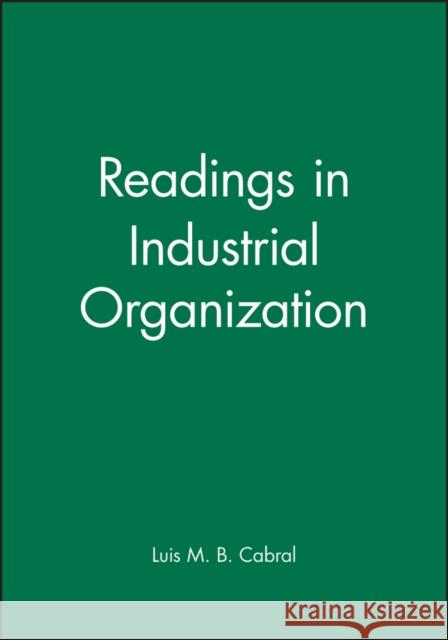Readings in Industrial Organization » książka



Readings in Industrial Organization
ISBN-13: 9780631216179 / Angielski / Miękka / 2000 / 468 str.
Readings in Industrial Organization
ISBN-13: 9780631216179 / Angielski / Miękka / 2000 / 468 str.
(netto: 284,53 VAT: 5%)
Najniższa cena z 30 dni: 294,50
ok. 30 dni roboczych.
Darmowa dostawa!
In Readings in Industrial Organization, Luis Cabral has assembled and placed into context the most important contributions to the literature of industrial organizations (IO) since the 1980s.
Preface.
Acknowledgements.
Part I: Static Oligopoly Theory: .
Introduction.
1. Capacity Precommitment and Bertrand Competition Yield Cournot Outcomes: David M. Kreps (Stanford University) and Jose A. Sheinkman (University of Chicago).
2. The Fat–Cat Effect, the Puppy Dog Ploy and the Lean Hungry Look: Drew Fudenberg (Harvard University) and Jean Tirole (Massachusetts Institute of Technology).
Part II: Repeated Games and Oligopoly Theory: .
Introduction.
3. Noncooperative Collusion Under Imperfect Price Information: Edward J. Green (University of Minnesota) and Robert H. Porter (Northwestern University).
4. A Supergame–Theoretic Model of Price Wars During Booms: Julio J. Rotemberg (Massachusetts Institute of Technology) and Garth Saloner (Stanford University).
5. Multimarket Contact and Collusive Behaviour: B. Douglas Bernheim (Stanford University) and Michael D. Whinston (Northwestern University).
Part III: Product Differentiation: .
Introduction.
6. On Hotelling′s Stability of Competition: Claude d′Aspremont, J. Jaskkold Gabszewicz and Jacques–Francois Thisse (all at Universite Catholique de Louvain, Center for Operations Research and Econometrics (CORE)).
7. Relaxing Price Competition Through Product Differentiation: Avner Shaked (University of Bonn) and John Sutton (London School of Economics).
8. Monopolistic Competition and Optimum Product Diversity: Avinash K. Dixit (Princeton University) and Joseph E. Stiglitz (Stanford University).
Part IV: Empirical Analysis of Oligopoly: .
Introduction.
9. The Oligopoly Solution is Identified: Timothy F. Bresnahan (Stanford University).
10. A Study of Cartel Stability: The Joint Executive Committee, 1880–1886: Robert H. Porter (Northwestern University).
11. Automobile Prices in Market Equilibrium: Steven Berry (Yale University), James Levinsohn (University of Michigan), and Ariel Pakes (Harvard University).
Part V: Entry: .
Introduction.
12. The Role of Investment in Entry Deterrence: Avinash Dixit (Princeton University).
13. Contracts as a Barrier to Entry: Philippe Aghion (Harvard University) and Patrick Bolton (Princeton University).
14. Free Entry and Social Inefficiency: N. Gregory Mankiw (Harvard University) and Michael D. Whinston (Northwestern University).
15. Selection and Evolution of Industry: Boyan Jovanovic (New York University).
Part VI: Technology and Dynamics: .
Introduction.
16. Preemptive Patenting and the Persistence of Monopoly Power: Richard J. Gilbert (University of California–Berkeley) and David M. G. Newberry (Cambridge University).
17. Uncertain Innovation and the Persistence of Monopoly: Jennifer F. Reinganum (Vanderbilt University).
18. The Learning Curve, Market Dominance, and Predatory Pricing: Luis M. B. Cabral (London Business School) and Michael H. Riordan (Boston University).
19. Preemption and Rent Equalization in the Adoption of New Technology: Drew Fudenberg (Harvard University) and Jean Tirole (Massachusetts Institute of Technology).
Part VII: Asymmetric Information:.
Introduction.
20. Reputation and Imperfect Information: David M. Kreps (Stanford University) and Robert Wilson (Stanford University).
21. Limit Pricing and Entry under Incomplete Information: Paul Milgrom (Stanford University) and John Roberts (Stanford University).
22. Price and Advertising Signals of Product Quality: Paul Milgrom (Stanford University) and John Roberts (Stanford University).
Index.
Luis M. B. Cabral is Professor of Economics at London Business School. A Research Fellow of the Centre for Economic Policy Research, Cabral′s research interests focus on industry dynamics as well as on regulation and competition policy. He is General Editor of the Journal of Industrial Economics and has been published in leading journals such as the Journal of Economic Theory and Econometrica. A Stanford PhD, he has taught various levels of economics at Stanford University, the University of Lisbon, and the London School of Economics.
In Readings in Industrial Organization, Luis Cabral has assembled and placed into context the most important contributions to the literature of industrial organizations (IO) since the 1980s. For students, this collection rises above and beyond a coursepack; for researchers, it is an essential reference. The readings also provide a useful point of entry to IO literature for economists for whom IO is not the main field of research. These readings cover core areas of IO and reflect the mostly theoretical nature of the latest work in the field:
- Static Oligopoly Theory
- Entry
- Repeated Games and Oligopoly Theory
- Technology and Dynamics
- Product Differentiation
- Asymmetric Information
- Empirical Analysis of Oligopoly.
1997-2026 DolnySlask.com Agencja Internetowa
KrainaKsiazek.PL - Księgarnia Internetowa









